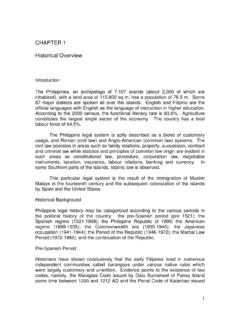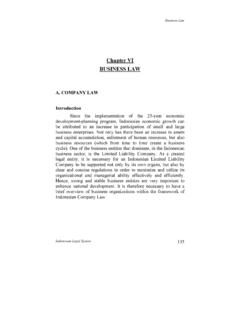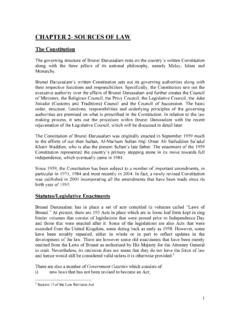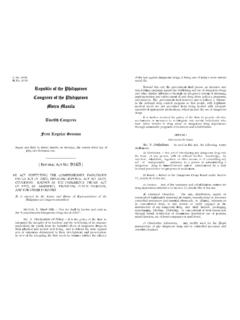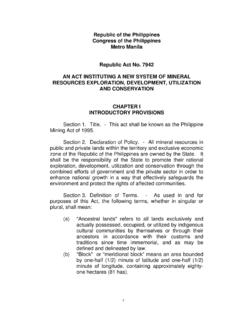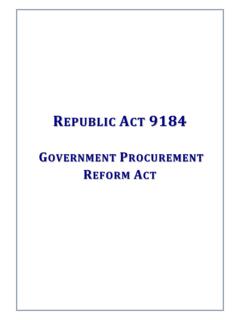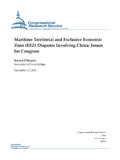Transcription of ARBITRATION IN THE PHILIPPINES - ASEAN LAW …
1 ARBITRATION IN THE PHILIPPINES . VICTOR P. LAZATIN AND. PATRICIA ANN T. PRODIGALIDAD. I. INTRODUCTION. Globalization has become the buzzword of the new millennium as developing countries seek to expand international trade and attract foreign investment. Quite understandably, the opening of domestic doors to foreign investors will inevitably result in more conflicts arising from the intrinsic complexity of international commerce as well as the inherent cultural and legal differences between trading nations. This chapter will discuss the role of commercial ARBITRATION in resolving these disputes in the PHILIPPINES . Perhaps owing to the Filipino's aversion to adversarial proceedings, and considering also the costly and slow process of litigation, commercial many quarters are working to make ARBITRATION in the PHILIPPINES an effective and efficient means of dispute resolution.
2 For that reason, the philippine legislation on commercial dispute resolution is slowly keeping pace with the developments in international trade. A. History of ARBITRATION in the PHILIPPINES ARBITRATION , as an alternative mode of dispute resolution, has long been recognized and accepted in the PHILIPPINES . In 1921, the philippine Supreme Court, applying common law, noted that: [t]he settlement of controversies by ARBITRATION is an ancient practice at common law. In its broad sense, it is a substitution, by consent of the parties, of another tribunal for the tribunals provided by the ordinary processes of law. Its object is the final 2.
3 Disposition, in a speedy and inexpensive way, of the matters involved, so that they may not become the subject of future litigation between the Early jurisprudence in the PHILIPPINES , however, was not supportive of ARBITRATION . Despite the recognition accorded to ARBITRATION by tradition and by provisions of the Civil Code, the use of ARBITRATION as a mode of dispute resolution was discouraged by the tendency of some courts to nullify ARBITRATION clauses on the ground that the clauses ousted the judiciary of its jurisdiction. Propitiously, in the early 1920's, the philippine Supreme Court began to lay the basis for the recognition and acceptance of ARBITRATION as a mode of settling disputes in the following ruling: In the PHILIPPINES fortunately, the attitude of the courts toward ARBITRATION agreements is slowly crystallizing into definite and workable form.
4 The rule now is that unless the agreement is such as to absolutely close the doors of the courts against the parties, which agreement would be void, the courts will look with favor upon such amicable agreements and will only with great reluctance interfere to anticipate or nullify the action of the arbitrator. 2. With this blessing bestowed by the courts, ARBITRATION became a viable alternative to costly and prolonged litigation. In turn, the growing frequency of ARBITRATION led to pressures for a regulatory law. In 1953, the philippine Congress enacted Republic Act No. 876, otherwise known as the ARBITRATION Law, 3 thereby adopting "the modern view that ARBITRATION as an inexpensive, speedy and amicable method of settling disputes and as a means of avoiding litigation should receive every encouragement from the courts.
5 "4. 1 Chan Linte vs. Law Union and Rock Insurance Co., et al., 42 Phil. 548 (1921). 2 Malcolm, J., dissenting, in Vega vs. San Carlos Milling Co., 51 Phil. 908 (1924); see also Manila Electric Co. vs. Pasay Transportation Co., 57 Phil. 600 (1932). 3 The full text of Republic Act No. 876 is included at the PHILIPPINES tab of the statutory appendix to this volume. 4 Eastboard Navigation Ltd. vs. Juan Ysmael & Co., Inc., 102 Phil. 1 (1957). 3. In 10 June 1958, the PHILIPPINES became a signatory to the United Nations Convention on the Recognition and the Enforcement of Foreign Arbitral Awards of 1958 (the "New York Convention ).
6 On 6 July 1967, the said Convention was ratified. Fifty years after the enactment of the philippine ARBITRATION Law, the philippine Congress enacted, Republic Act No. 9285, otherwise know as the Alternative Dispute Resolution Act of 2004. The enactment of Republic Act No. 9285 was the PHILIPPINES solution to making ARBITRATION an efficient and effective method in dispute resolution specially for international ARBITRATION . Prior to the enactment of Republic Act No. 9285, there were no laws prescribing the mechanics for the conduct of international ARBITRATION . Instead, when dealing with disputes regarding international contracts, philippine entities, including the Government, are often required to agree to dispute settlement by ARBITRATION in the foreign country under the rules of foreign arbitral institutions.
7 5 Worse, notwithstanding the PHILIPPINES ' adherence to the New York Convention, no legislation has been passed providing a specific procedure for the enforcement of foreign arbitral awards. Thus, there have been instances in which international arbitral awards have been treated by philippine courts as akin to foreign judgments for lack of specific invocation of the New York Convention. As a consequence, foreign arbitral awards have sometimes been deemed only presumptively valid, rather than conclusively valid, as required by the New York Convention. 6. Under Republic Act No. 9285, the PHILIPPINES unequivocally declared that it is its policy to actively promote party autonomy in the resolution of disputes or the freedom of the parties to make their own arrangements to resolve their disputes and encourage and actively promote the use of Alternative Dispute Resolution (ADR) as an important means to achieve speedy and impartial justice and declog court dockets.
8 7. 5 United Nations Commission in International Trade Law ( UNCITRAL ) Model Law Bill, Explanatory Note. 6 New York Convention, Art. III ( Each contracting state shall recognize arbitral awards as binding ). 7 Republic Act No. 9285, 4. To keep pace with the developments in international trade, Republic Act No. 9285 also ensured that international commercial ARBITRATION would be governed by the United Nations Commission in International Trade ( UNCITRAL ) Model Law on International ARBITRATION adopted by the United Nations Commission on International Trade Law on June 21, Republic Act No. 9285 also fortified the use and purpose of the New York Convention by specifically mandating that it shall govern the recognition and enforcement of arbitral awards covered by the said convention 9 , while foreign arbitral awards not covered by the New York Convention shall be recognized and enforced in accordance with the procedural rules to be promulgated by the Supreme Court.
9 10. Moreover, Republic Act No. 9285 updated the rather antiquated philippine ARBITRATION Law or Republic Act No. 876. Presently, the Congressional Oversight Committee is reviewing the draft of the Implementing Rules and Regulations of Republic Act No. 9285. At the same time, the Supreme Court of the PHILIPPINES is formulating the Special Rules of Court on Alternative Dispute Resolution, which will govern the procedure to be followed when recourse is made to the courts on any matter, which is subject of ARBITRATION or other forms of alternative dispute resolution. B. The Practice of ARBITRATION in the PHILIPPINES Today At present, ARBITRATION practice in the PHILIPPINES is either ad hoc, institutionalized or specialized.
10 For ad hoc ARBITRATION , philippine law grants the parties the right to select an arbitrator or arbitrators and to choose procedures to govern the proceedings, including rules of ARBITRATION institutions. So long as the main requirement for ARBITRATION , namely consent, is present, the State allows the parties to conduct the ARBITRATION in any manner they 8 Republic Act No. 9285, Secs. 19-31. 9 Republic Act No. 9285, Sec. 42. 10 Republic Act No. 9285, Sec. 43. 5. stipulate, provided that the ARBITRATION process is not "contrary to law, morals, good customs, public order or public policy." 11. Institutionalized ARBITRATION is conducted through organized bodies such as courts of ARBITRATION , trade associations, and ARBITRATION centers and institutes, each prescribing its own different ARBITRATION procedure.
